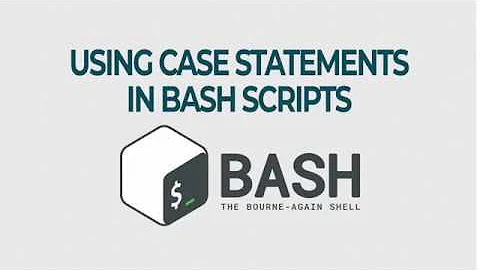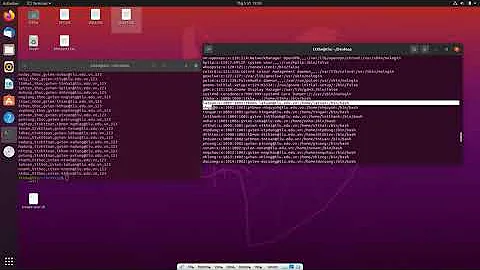How to create a UUID in bash?
Solution 1
See the uuidgen program which is part of the e2fsprogs package.
According to this, libuuid is now part of util-linux and the inclusion in e2fsprogs is being phased out. However, on new Ubuntu systems, uuidgen is now in the uuid-runtime package.
To create a uuid and save it in a variable:
uuid=$(uuidgen)
On my Ubuntu system, the alpha characters are output as lower case and on my OS X system, they are output as upper case (thanks to David for pointing this out in a comment).
To switch to all upper case (after generating it as above):
uuid=${uuid^^}
To switch to all lower case:
uuid=${uuid,,}
If, for example, you have two UUIDs and you want to compare them in Bash, ignoring their case, you can do a tolower() style comparison like this:
if [[ ${uuid1,,} == ${uuid2,,} ]]
Solution 2
To add variety without adding external dependencies, on Linux you can do:
UUID=$(cat /proc/sys/kernel/random/uuid)
To propagate bad practices, on FreeBSD, under the linux compatibility layer (linuxulator?),
UUID=$(cat /compat/linux/proc/sys/kernel/random/uuid)
References:
Solution 3
Just for the sake of completeness... There's also a UUID generator installed with the dbus package on Debian. I missed it looking around earlier. It's probably the same algorithm as the e2fsprogs package, but it doesn't add the dashes, so it might be a little cleaner for you:
$ uuidgen
387ee6b9-520d-4c51-a9e4-6eb2ef15887d
$ dbus-uuidgen
d17b671f98fced5649a856a54b51c9e6
Grawity adds a safety tip: "DBus UUIDs are not related to or compatible with RFC 4122. Besides, dbus-uuidgen always uses the Unix timestamp as the last 4 bytes. So they might be unsuitable for some uses." (Thanks, Grawity, I should've spotted that in the manpage.)
Solution 4
If you do not want to depend on other executables, or you cannot use them, here is the pure bash version from here:
# Generate a pseudo UUID
uuid()
{
local N B T
for (( N=0; N < 16; ++N ))
do
B=$(( $RANDOM%255 ))
if (( N == 6 ))
then
printf '4%x' $(( B%15 ))
elif (( N == 8 ))
then
local C='89ab'
printf '%c%x' ${C:$(( $RANDOM%${#C} )):1} $(( B%15 ))
else
printf '%02x' $B
fi
for T in 3 5 7 9
do
if (( T == N ))
then
printf '-'
break
fi
done
done
echo
}
[ "$0" == "$BASH_SOURCE" ] && uuid
Solution 5
I have found this script "one-liner" useful where uuidgen is not available. This also bypasses any neccessity to install external modules for Perl or Python.
od -x /dev/urandom | head -1 | awk '{OFS="-"; print $2$3,$4,$5,$6,$7$8$9}'
Tested on SnowLeopard, Red Hat Valhalla, Solaris 9 4/04 and newer successfully. I am curious if this is prone to non-uniqueness, but I have not been 'bit'ten in the last 10 years. Of course, head -1 could be replaced with head -_other-value_ | tail -1 too.
To explain,
/dev/random and /dev/urandom are kernel random generators.
od (octal dump) has a hex output switch (-x) producing 16 bytes per line.
head -n [| tail -1] (where n>0) extracts just one line of the previous output.
awk sets the OutputFieldSeparator to be a hyphen everywhere a comma occurs in the print statement. By specifying fields 2-9 independently, we control the hyphens and strip off the index/offset counter that 'od' prefixes each line of output with.
The result is a pattern of 8-4-4-4-12 lower case characters a-f0-9.
993bb8d7-323d-b5ee-db78-f976a59d8284
Related videos on Youtube
raoulsson
CTO at Contovista AG Before: CEO at Zorp Technologies Inc., San Francisco, ...until Google Lens came out... Experienced software engineer and teamlead looking to build/enable useful, delightful, and meaningful products. Passionate, hard-worker interested in contributing to team-oriented, strong engineering cultures. Proven track record of hiring and running successful teams.
Updated on September 17, 2022Comments
-
 raoulsson over 1 year
raoulsson over 1 yearIn Java it is possible to create a random UUID:
UUID uuid = UUID.randomUUID();How to do this in Bash?
-
quack quixote over 14 yearshey, no fair! my e2fsprogs didn't come with that! i want one, where do i get it? (update: ahhh... debian sticks it in the
uuid-runtimepackage for no apparent reason... +1 to you) -
user1686 over 14 yearsDBus UUIDs are not related to or compatible with RFC 4122. Besides,
dbus-uuidgenalways uses the Unix timestamp as the last 4 bytes. So they might be unsuitable for some uses. -
rafa.ferreira about 13 years+1 - Help me a lot!
-
Tom O'Connor over 10 yearsThis is awesome.
-
Good Person almost 10 yearsThis should be avoided as it is highly non-portable (although FreeBSD supplies /compat/linux/proc/sys/kernel/random/uuid for poorly written applications)
-
 Dennis Williamson almost 10 yearsThe
Dennis Williamson almost 10 yearsTheTvariable can be eliminated and thefor Tloop can be changed to:case $N in 3 | 5 | 7 | 9) printf '-';; esac(broken out on separate lines if preferred). -
 Dennis Williamson almost 10 yearsI added a comment to the code at the github link showing a version using
Dennis Williamson almost 10 yearsI added a comment to the code at the github link showing a version usingcaseto eliminate theifstatements as well as the innerforstatement. It makes the code much neater. Note that bothB%15should beB%16andB%255should beB%256. -
Rob almost 10 yearsEDIT: Just read the last line. I'm a dork. Please carry on..... Be interested to hear why this is bundled in e2fsprogs, as this doesn't really seem that much like a filesystem-specific tool to me.
-
 Dennis Williamson almost 10 years@Rob: To answer your original question, it's for drive labels.
Dennis Williamson almost 10 years@Rob: To answer your original question, it's for drive labels. -
Maximilian almost 9 yearsIt fits perfectly for usage inside of initrd image
-
Roberto Andrade over 8 yearsAgree completely! For my use case it was perfect as it also supports namespacing via the
-v3 ns:URL custom-dataseeding mechanism. -
 David over 8 yearsThe FreeBSD method doesn't appear to be on Mac OS X (nor the Linux method). At least uuidgen appears to be preinstalled on the Mac (or was installed with something else I installed).
David over 8 yearsThe FreeBSD method doesn't appear to be on Mac OS X (nor the Linux method). At least uuidgen appears to be preinstalled on the Mac (or was installed with something else I installed). -
 David over 8 yearsI notice uuidgen on Mac emits in all uppercase while on Ubuntu (uuidgen from util-linux 2.20.1) in all lowercase. Why the difference? Also Ubuntu listed where the tool came from but on Mac, there's no version info nor which package it came from.
David over 8 yearsI notice uuidgen on Mac emits in all uppercase while on Ubuntu (uuidgen from util-linux 2.20.1) in all lowercase. Why the difference? Also Ubuntu listed where the tool came from but on Mac, there's no version info nor which package it came from. -
 Dennis Williamson over 8 years@David: I believe it's part of the base operating system on OS X. I have no idea why one is upper case and the other is lower. It doesn't really matter since either represents valid hex characters (
Dennis Williamson over 8 years@David: I believe it's part of the base operating system on OS X. I have no idea why one is upper case and the other is lower. It doesn't really matter since either represents valid hex characters (echo -e 'f\nF' | grep '[[:xdigit:]]'outputs both lines). If it does matter for you and you have Bash 4, you can do this to make it lower case:uuid=$(uuidgen); uuid=${uuid,,}or this to make it upper case:uuid=$(uuidgen); uuid=${uuid^^}or something along these lines to do atolower()style test:if [[ ${uuid1,,} == ${uuid2,,} ]] -
 Samveen over 8 years@David you are absolutely right. The FreeBSD method is for
Samveen over 8 years@David you are absolutely right. The FreeBSD method is forFreeBSD, and the Linux method is forLinux, as mentioned in the answer. Anybashscript that need to run on all 3 systems (FreeBSD,Linux,MacOS) will need to check againstuname -sand use the appropriate method. -
dguerri about 8 yearsThis should be the best answer!
-
jacderida almost 8 yearsThis is a better answer for really minimal setups, like a Docker container.
-
 Chris Harrington over 7 yearsThis is overall a very bad practice. Modern computers are perfectly capable of running many things in parallel and completing serial tasks quickly, but this ID will be identical for any invocations that are within one second of another. Not to mention any other computers running this script at the same time. A better-but-still-not-great option would be
Chris Harrington over 7 yearsThis is overall a very bad practice. Modern computers are perfectly capable of running many things in parallel and completing serial tasks quickly, but this ID will be identical for any invocations that are within one second of another. Not to mention any other computers running this script at the same time. A better-but-still-not-great option would bemktemp -uas inMYID="$(mktemp -u)". If you can afford to have empty temp files laying around until reboot, drop the-u:MYID="$(mktemp)" -
Brad Parks over 7 yearsHey... good points on the only unique to the second point... I'll add some notes above...
-
dinigo over 7 yearsBrilliant! just a single line with no dependencies, BSD/macOS compatible... great
-
 kmonsoor over 6 yearssame works on Fedora-25, too ...
kmonsoor over 6 yearssame works on Fedora-25, too ... -
 UncaAlby over 6 yearsDo NOT use "tail -1". If you run just "od -x /dev/urandom" by itself, it goes on indefinitely, continuously producing more lines of random data. "tail -1" may just sit there forever waiting for the "last" line. Otherwise, it's a good solution.
UncaAlby over 6 yearsDo NOT use "tail -1". If you run just "od -x /dev/urandom" by itself, it goes on indefinitely, continuously producing more lines of random data. "tail -1" may just sit there forever waiting for the "last" line. Otherwise, it's a good solution. -
dan over 6 yearsPlease note, tail is only in the "explanation" as an optional parameter when the number of lines output by head is greater than one. There to ensure receiving a single line of 16 bytes by awk, and is not part of the original command. The pipe to head from od already sanitizes the output for piping to tail -1. In my experience, the only time tail waits forever is with a -f argument. I apologize if the explanation was not clear where it states the use of tail -1 is only necessary when the output of head produces more than one line.
-
jlh almost 6 yearsDo not use this, it completely violates the UUID specification. Only version 4 UUID are allowed to be random like this.
-
andyfff almost 6 yearsx=
od -X -A n /dev/random | head -1 | cut -c3-38gives you this below echo $x 4151540a 1f7d0bef 8a0725fb d26183a3 uuid=echo ${x} | cut -c1-8-echo ${x} | cut -c10-13-echo ${x} | cut -c14-17-echo ${x} | cut -c19-22-echo ${x} | cut -c23-26``echo ${x} | cut -c28-35echo $uuid 4151540a-1f7d-0bef-8a07-25fbd26183a3 -
andyfff almost 6 yearsDave M, back doing bash after many years away, this is very much at the edge of my current knowldge. Hope breaking it down a bit helps. cheers, andyfff
-
 kasperd over 5 yearsJava 10 is not bash.
kasperd over 5 yearsJava 10 is not bash. -
amit over 5 yearsI just gave an example on how quickly he can generate a UUID on terminal without running a java program. People gave example of using dbus-uuidgen and uuidgen. Whats wrong with using jshell?
-
 Samveen over 5 years@amit the point is that you need to give an example where
Samveen over 5 years@amit the point is that you need to give an example wherejshellcan be used in bash scripting, and not as an interactive command. That is very clear in the original post. -
Stuart P. Bentley over 5 years@jlh I'm not sure why this question was locked, but here's a fixed version that makes this approach UUID-v4 compliant:
od -x /dev/urandom | head -1 | awk '{OFS="-"; srand($6); sub(/./,"4",$5); sub(/./,substr("89ab",rand()*4,1),$6); print $2$3,$4,$5,$6,$7$8$9}' -
mlk about 5 yearsIf you must do something list this, you could do
echo "System.out.println(java.util.UUID.randomUUID().toString())" | /Library/Java/JavaVirtualMachines/openjdk-11.0.1.jdk/Contents/Home/bin/jshell -s | grep -v ">"But it is a lot more long winded thanuuidgen. -
 Alexander Mills almost 5 yearsUmmm I just want to know how to install one of these on macos or linux...pls
Alexander Mills almost 5 yearsUmmm I just want to know how to install one of these on macos or linux...pls -
 Alexander Mills almost 5 yearsis uuid a built-in?
Alexander Mills almost 5 yearsis uuid a built-in? -
 Alexander Mills almost 5 yearsHas python ever worked? I get this ` File "<string>", line 1 import uuid; print uuid.uuid1() ^ SyntaxError: invalid syntax `
Alexander Mills almost 5 yearsHas python ever worked? I get this ` File "<string>", line 1 import uuid; print uuid.uuid1() ^ SyntaxError: invalid syntax ` -
Joseph almost 5 years
-
 abdusco almost 5 yearsUse
abdusco almost 5 yearsUsepython3 -c "import uuid; print(uuid.uuid4())"for python3






